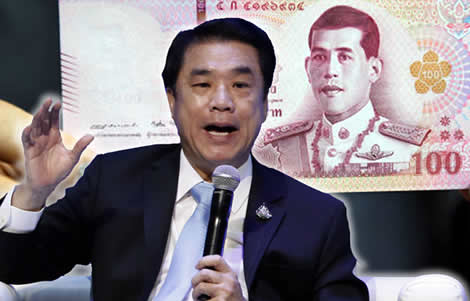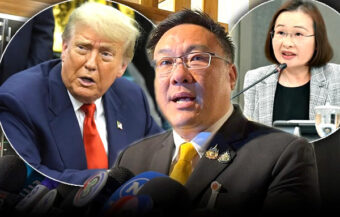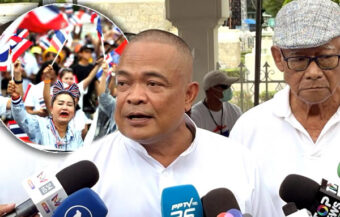The Moodys upgrade of the Thai government’s ratings and that of Thai banks last month underlines the country’s strong fundamentals which before July’s central bank regulations drew $3 billion of overseas funds into Thailand. That trend has now been reversed but most experts say it will resume especially if there is a further interest rate cut in the United States.
Thailand’s Industry Minister Suriya Juangroongruangkit called for a lower-valued Thai baht and a targeted rate of ฿32 against the US dollar in Bangkok on Monday. It follows a prediction by ING Bank going against a Reuters poll consensus, that the Bank of Thailand will lower interest rates on Wednesday by 25 points. Most financial analysts say the rate will be kept on hold as there is evidence that the regulatory measures taken by Thailand’s central bank in July to curb speculation in the Thai baht have worked. The Thai baht was Asia’s worst-performing currency for the month against the US dollar and lost ground.
Thailand’s industry minister on Monday called strongly for action to be taken by the Bank of Thailand to rein in the Thai baht which is Asia’s top-performing currency this year against the US dollar.

The minster, Suriya Juangroongruangkit, was speaking at a business forum organised by the Bangkok Post newspaper in Bangkok. He revealed that he will be discussing the matter soon with the Governor of the Bank of Thailand Veerathai Santiprabhob.
Senior Thai government minister calls for ฿32 target rate against the dollar to assist business
The senior minister was unabashed in calling for the baht to be controlled against the US currency and said that a rate against the dollar of ฿32 was the most appropriate for Thailand’s business interests at this time.
Currently, the baht is trading at ฿30.75 against the US currency and there has been some evidence suggest that Thai currency has been checked by regulatory measures introduced in July to curb foreign funds flowing into Thailand. Indeed, the baht lost ground in July as funds poured out of Thailand and ended the month as Asia’s worst-performing currency against the greenback.
Reuters poll favours a hold in interest rates
There are mixed opinions about what comes next. Most Thai financial analysts think that the Bank of Thailand will resist a rate cut which would now be quite opportune following the US Fed’s rate cut last week. In a Reuters poll just published, the vast majority of financial firms end experts suggested that the Bank of Thailand will hold tight and do nought for now and hold rates at 1.75% already just fifty points above an all-time low.
Some are suggesting that the bank may wait on the government’s soon to be rolled out financial stimulus while others suggest that a lowering of the interest rate may open Thailand to further, more serious problems given the high levels of household debt and the volatility of world financial markets right now.
ING Bank is predicting a 0.25% cut in Thai interest rates this week, also a lower growth rate
However, ING Bank which has an office in Thailand has come out and suggested that it is expecting a 0.25% rate reduction to be announced on Wednesday. The bank is also among the most hawkish about Thailand’s economic prospects this year only predicting a growth rate of 2.8% but even this is now dependent on the government’s economic stimulus after figures for June showed domestic consumption below expectations and the probability at this point, of an export contraction.
Roiling tensions between the US and China driving turmoil and choking off economic growth
HSBC Bank also supports the suggestion of a rate cut but suggests it will be later in the year. However, ING sees a second rate cut by the end of the year. This together with the regulatory measures should help the Thai currency withstand the global forces as money seeks a safe haven amid increasing world tensions and the looming spectre of Brexit. Brexit is inevitably going to be an economic spark one way or another and is coming amidst roiling tensions between the United States and China. The uncertainty caused by trade tensions is choking off economic growth outside of the United States.
Senior Bank of Thailand figure recently warned not to rule out lower interest rates
It should also be noted that Bank of Thailand senior official, Don Nakornthab, told a conference recently that analysts should not rule out the prospect of a lowering of interest rates and only this week, he pointed out that Thailand’s growth rate in the second quarter was lower than that of the first. It was, in fact, the lowest in four years.
Current assessment of the Thai economy
Either way, the Bank of Thailand is expected on Wednesday to give an assessment of the current economic outlook for the country which in no way can be construed as a positive one right now in spite of the healthy fundamentals that before July had attracted up to $3 billion in inflows from overseas in the prior 12 months.
Strong baht causing Thailand to lose out to other Asian countries in trade and tourism
Despite denials and rationalisations that the baht is not affecting the country’s economy by some, the hard reality is that it is impacting Thailand’s agricultural and industrial exports as well as tourism. It is not so much the absolute level of the baht’s value against the US dollar, it has been higher, but its value today in relation to other Southeast Asian economies, which is causing the problem. These countries are competing with Thailand for declining volumes of trade and tourism, particularly from western countries.
Upgrade by Mooodys highlighted and recognised Thailand’s strong fundamentals
The overwhelming problem is the destabilised world economy caused by the US-China trade war, Brexit and growing internal problems in Europe across a number of countries not least concern over the German economy, Deutsche Bank and Italy. Money is flowing to Thailand because of prudent management of the Thai economy over the years and strong fundamentals. The recent upgrade by Moody’s of the governments’ ratings and that of the Thai banks underlines this.
Interest rate cut would not be out of line
On the other hand, the Bank of Thailand is very much aware that overreaction could be counterproductive. Indeed, some moves other than a rate cut may possibly have the effect of strengthening the baht further. However, the measures imposed in July were well-weighted and an interest rate cut for a stalling economy would not be out of line.
Further reading:
Moody’s – debt is 98.5% denominated in Thai baht as two views of the economy are at odds
Crunch for Thai economy as exports dive. Fears that Thai baht has become a focus of speculation
Thai baht is the key reason for the continued faltering of Thailand’s exports and cross border trade


















